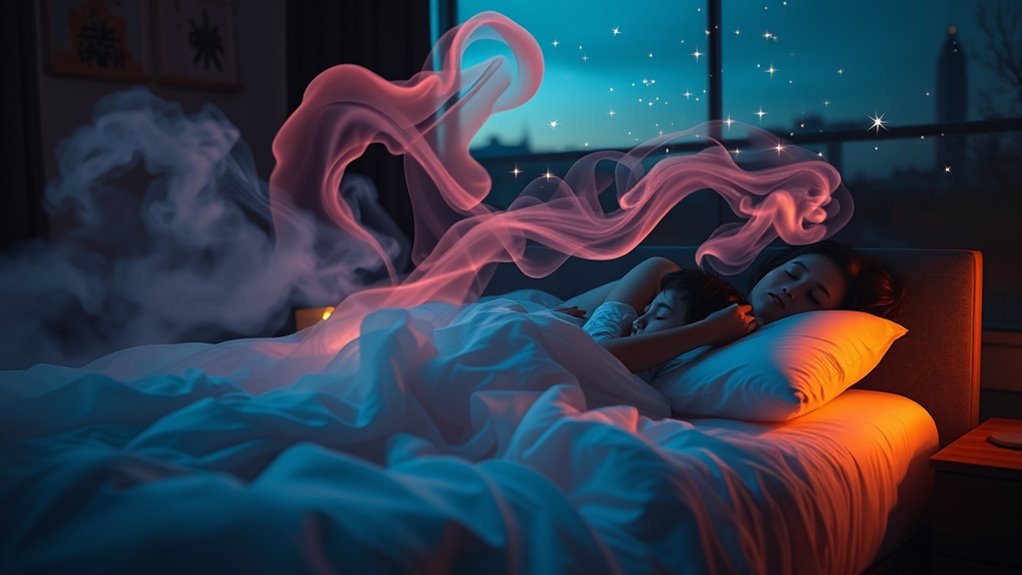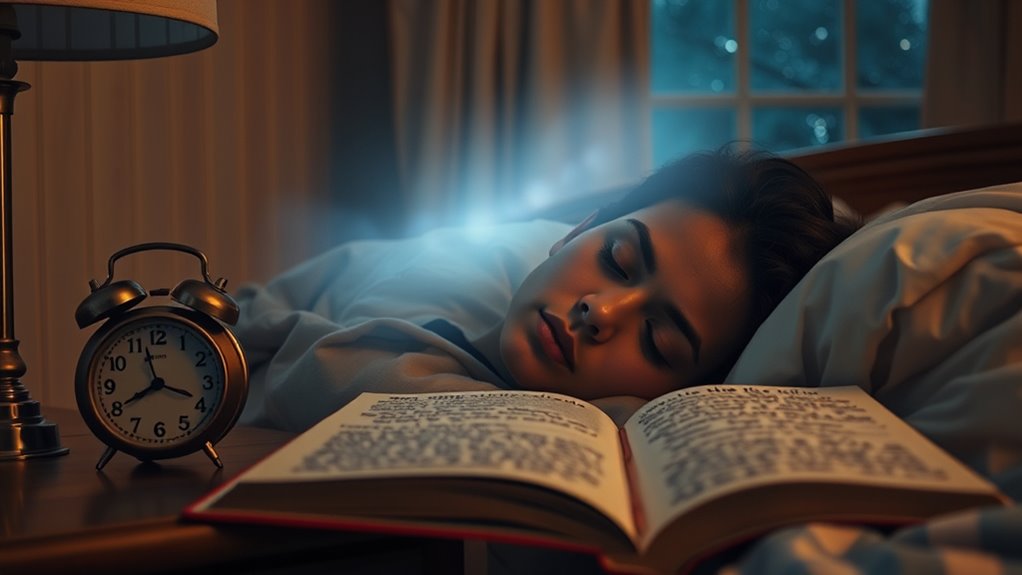Dreams help you process emotions, memories, and subconscious thoughts, offering insight into your inner mind. During REM sleep, your brain becomes highly active, creating vivid scenarios that often symbolize hidden fears, desires, or conflicts. These dreams assist in emotional regulation, problem-solving, and memory consolidation. Researchers believe that if you explore these dream symbols further, you’ll uncover more about your subconscious. Keep exploring to better understand the fascinating purpose that dreams serve in your life.
Key Takeaways
- Dreams may serve to process emotions, memories, and unresolved conflicts stored in the subconscious during REM sleep.
- Dream symbols often reflect inner thoughts, fears, desires, helping us understand our emotional state.
- REM sleep is vital for emotional regulation, memory consolidation, and problem-solving, with vivid dreams occurring mainly in this stage.
- Dreams might help rehearse challenges, foster creativity, and provide psychological insights by working through complex feelings.
- Ongoing research suggests dreams are a way for the brain to maintain mental health, self-awareness, and emotional resilience.

Have you ever wondered why we dream? It’s a question that has fascinated humans for centuries, and scientists are still trying to uncover the true purpose behind our nightly visions. One popular explanation involves the symbolic meanings behind our dreams. When you dream, your mind often creates vivid images and scenarios that might seem random, but many believe they carry deeper messages. These symbolic meanings could reflect your subconscious thoughts, fears, desires, or unresolved conflicts. For example, dreaming of flying might symbolize a desire for freedom or escape, while dreaming of being chased could indicate stress or avoidance. By analyzing these symbols, some psychologists think you can better understand your inner world and emotional state.
Another key aspect of dreaming is REM sleep, which stands for rapid eye movement sleep. During this stage, your brain becomes highly active, almost as if you’re awake, and most vivid dreams occur. REM sleep is essential for many reasons, including memory consolidation and emotional regulation. When you enter REM sleep, your body temporarily paralyzes itself, preventing you from acting out your dreams. This stage typically occurs several times during a night’s sleep, with each REM period becoming longer as the night progresses. Scientists believe that REM sleep serves a fundamental function in processing emotions and experiences, helping you integrate new information and resolve conflicts stored in your subconscious.
In fact, the connection between REM sleep and dreams suggests that your brain uses this time to work through unresolved issues or emotional traumas. When you wake up, especially after a vivid dream, it’s common to feel a sense of clarity or emotional release. Some theories propose that dreaming during REM sleep is a way for your brain to rehearse real-life challenges, improve problem-solving skills, or even foster creativity. The symbolic meanings embedded in dreams during REM sleep might be your mind’s way of exploring different scenarios or working out complex feelings in a safe, subconscious space.
Ultimately, whether dreams serve as a form of emotional processing, a way to store memories, or a source of symbolic insights, they remain a fascinating window into your inner life. As research advances, you’ll continue to uncover new reasons why your mind crafts these vivid stories each night, especially during the mysterious REM sleep stage.
Frequently Asked Questions
Can Dreaming Help Improve Problem-Solving Skills?
Dreaming can indeed help you improve problem-solving skills, especially through lucid dreaming. When you’re aware you’re dreaming, you can actively explore solutions or ideas, boosting your creativity. Dreams often provide unique perspectives, aiding creative problem solving. By practicing lucid dreaming, you might find yourself better at tackling challenges in waking life, as your subconscious works through complex issues, revealing new insights and innovative approaches.
Do Animals Dream Like Humans Do?
Imagine animals as silent storytellers, sharing their dreams through subtle clues. You might wonder if they dream like humans, given animal cognition and dream evidence. Current research suggests yes, many animals experience REM sleep, indicating they dream. While their dreams may differ, the evidence points to a shared inner world, where animals process their experiences. You can see this as a bridge linking human and animal consciousness, revealing a fascinating shared domain.
How Do Dreams Influence Mental Health?
Dreams play a significant role in your mental health by helping with emotional processing and understanding dream symbolism. When you dream, your brain sorts through feelings and experiences, which can reduce stress and improve mood. Recognizing dream symbolism can reveal subconscious worries, guiding you to address issues. By paying attention to your dreams, you support emotional well-being and gain insight into your inner thoughts, fostering better mental health overall.
Why Do Some People Remember Their Dreams More Than Others?
Ever wonder why some people remember their dreams more vividly? It all comes down to dream recall and memory retention. You might find that your sleep habits, stress levels, or even genetics impact how well you remember dreams. People who wake up during or right after REM sleep tend to have better dream recall. Improving sleep hygiene and keeping a dream journal can boost your ability to remember dreams more clearly.
Are There Any Health Risks Associated With Dreaming?
You might wonder if dreaming poses health risks. While dreaming itself isn’t harmful, dream deprivation or frequent sleep disturbances can disrupt your sleep quality. Lack of dreams may lead to fatigue, stress, or memory issues. Persistent sleep problems can also increase the risk of health conditions like depression or weakened immunity. So, ensuring good sleep hygiene helps prevent these risks and supports overall well-being.
Conclusion
So, next time you drift into sleep, remember—you’re opening the universe’s biggest mystery! Dreams aren’t just random nonsense; they’re your brain’s way of playing the greatest movie ever made—starring YOU! Every night, your mind’s working overtime, creating worlds, solving problems, and even predicting the future. So, embrace your dreams—because in the grand scheme of the cosmos, they might just hold the key to unlocking the secrets of existence itself! Sleep tight, dream on, and conquer the universe!










